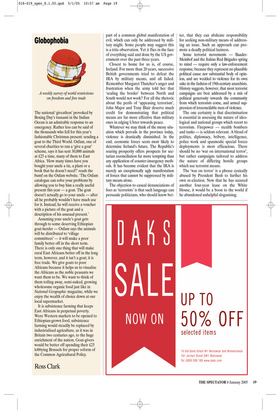Globophobia
A weekly survey of world restrictions on freedom and free trade The national ‘giveathon’ provoked by Boxing Day’s tsunami in the Indian Ocean is an admirable response to an emergency. Rather less can be said of the thousands who fell for this year’s fashionable Christmas present: sending a goat to the Third World. Oxfam, one of several charities to run a ‘give a goat’ scheme, says it has sent 30,000 animals at £25 a time, many of them to East Africa. ‘How many times have you bought your uncle a tie, a plant or a book that he doesn’t need?’ reads the bumf on the Oxfam website. ‘The Oxfam catalogue can solve your problems by allowing you to buy him a really useful present this year — a goat. The goat doesn’t actually go to your uncle — after all he probably wouldn’t have much use for it. Instead, he will receive a voucher with a picture of the goat and a description of his unusual present.’ Assuming your uncle’s goat gets through to some deserving Ethiopian goat-herder — Oxfam says the animals will be distributed to ‘village committees’ — it will make a poor family better off in the short term. There is only one thing that will make rural East Africans better off in the long term, however, and it isn’t a goat; it is free trade. We give goats to poor Africans because it helps us to visualise the Africans as the noble peasants we want them to be. We want to think of them toiling away, semi-naked, growing wholesome organic food just like in National Geographic magazine, while we enjoy the wealth of choice down at our local supermarket.
It is subsistence farming that keeps East Africans in perpetual poverty. Were Western markets to be opened to Ethiopian-grown food, subsistence farming would steadily be replaced by industrialised agriculture, as it was in Britain two centuries ago, to the huge enrichment of the nation. Goat-givers would be better off spending their £25 lobbying Brussels for proper reform of the Common Agricultural Policy.
Ross Clark










































 Previous page
Previous page